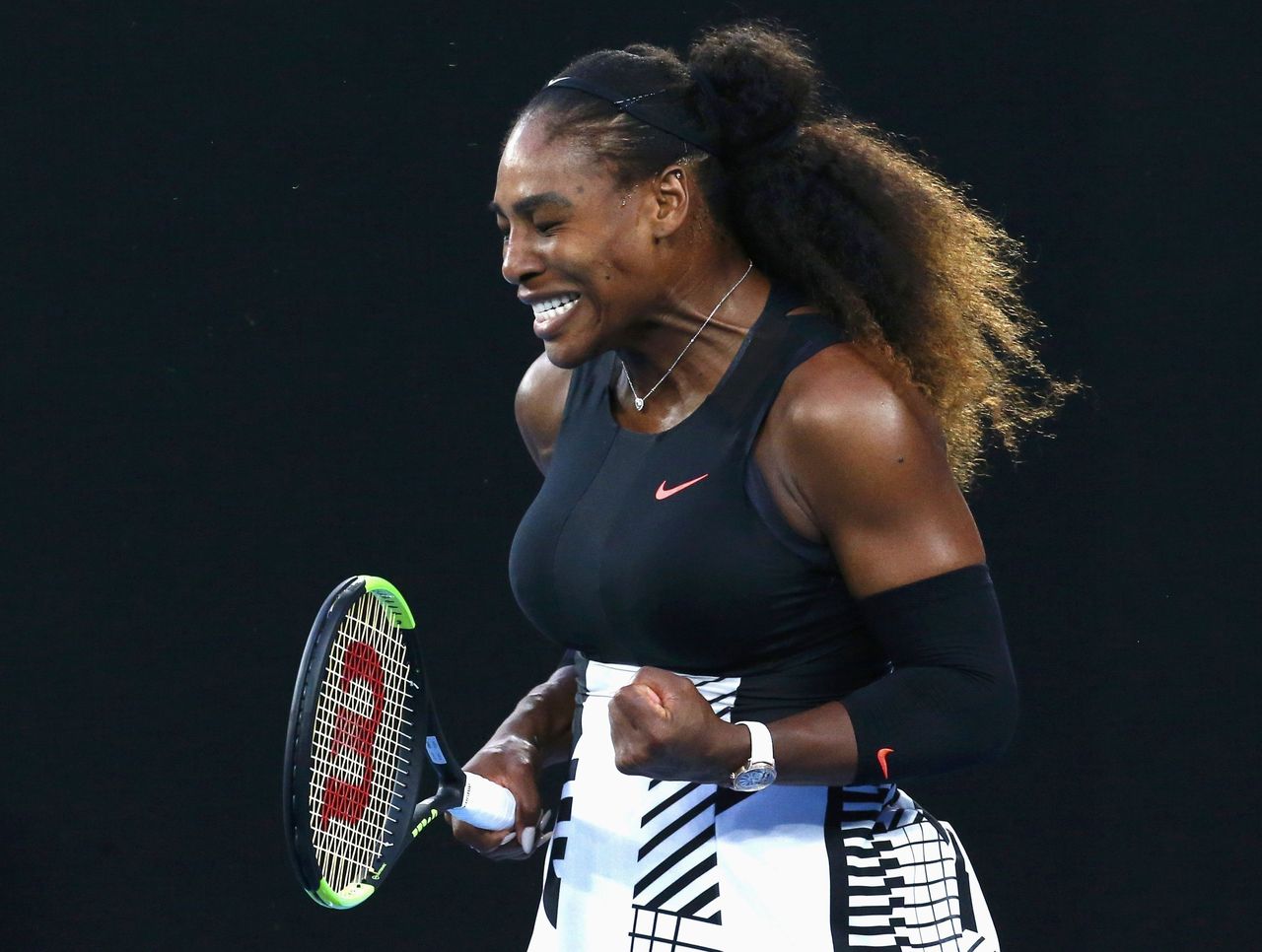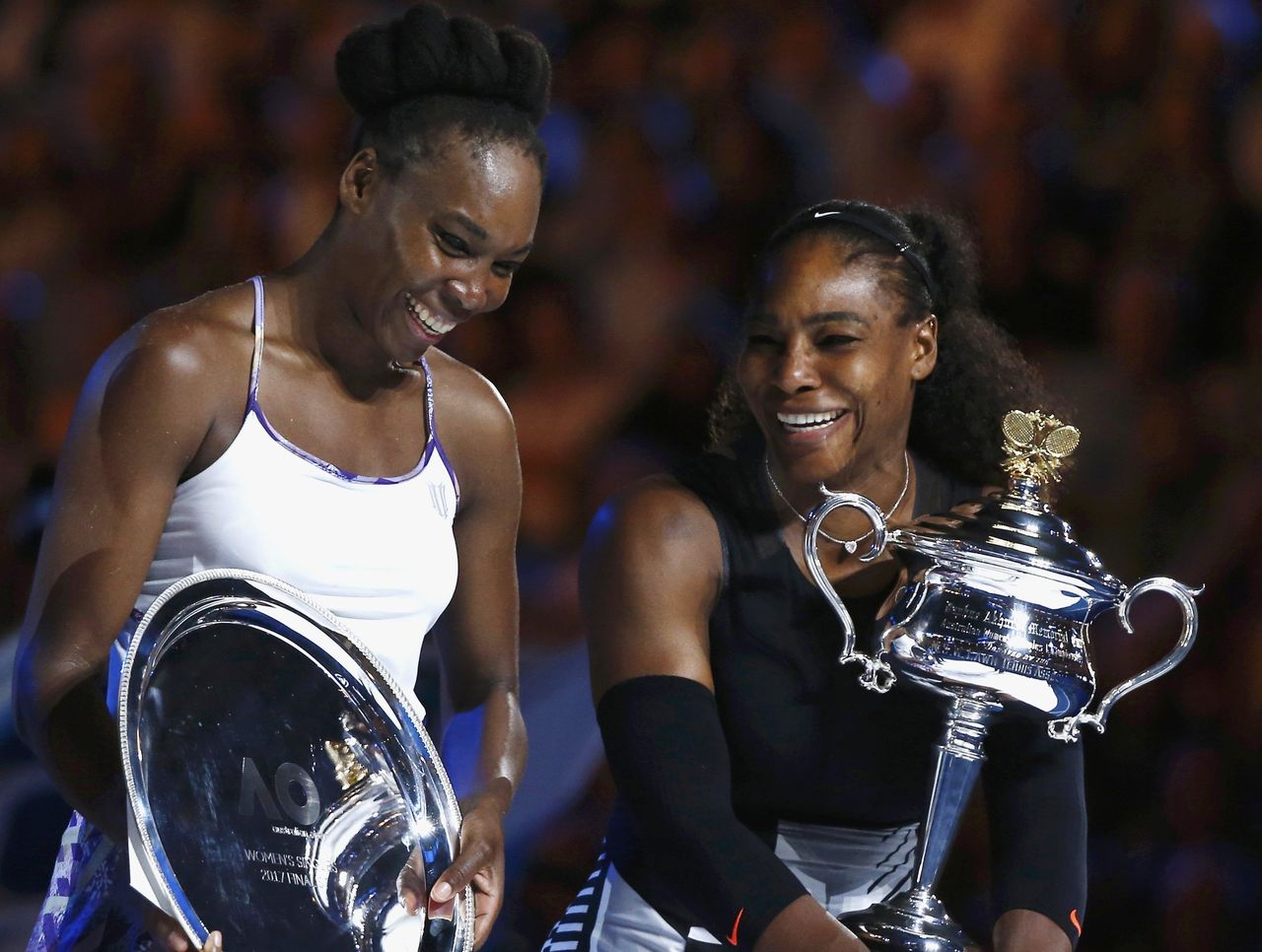As ever, Serena-Venus final offers joy and pain in equal measure
It was not one of Serena Williams' more graceful celebrations.
As she watched Venus' desperate backhand lob on match point land in the doubles alley, giving Serena a record 23rd Grand Slam title, she seemed momentarily unsure how to react, caught between wanting to do justice to her momentous achievement and not wanting to show up her big sister.
She did a little spin, and started to fall backwards, the way she'd done after winning her 22nd Slam to tie Steffi Graf's record at Wimbledon last year. But she seemed to catch herself in the act, deciding against falling flat on her back and maybe having second thoughts about falling down at all, though by then it was too late. She ended up just sort of ... sitting down.
Serena sits down after defeating Venus pic.twitter.com/W8f7dYapKc
— CJ Fogler (@cjzero) January 28, 2017
The way she celebrated does not matter, obviously. Serena has long existed in her own athletic stratosphere, and now finally has the number - 23. Twenty-three - to definitively prove it. But the celebration struck me because of how microcosmic it was of the push-and-pull that makes up the whole Serena-Venus experience.
It is incredible to watch them play each other - in any situation, but especially in a Grand Slam final - because you know what you're watching is an unlikelihood that borders on impossibility: sisters born a year apart, raised and groomed together on rough-and-tumble public courts in Compton, competing on the sport's biggest stage, having become the two most successful players of their generation. It's thrilling to watch the similarities in their games - the fluidity and power, the easy service delivery, the wide-open stance with which they hit their backhands - and be able to trace it back to a single point of origin.
I find it uncomfortable to watch them play for these same reasons. Particularly in a match that had as much at stake as Saturday's Australian Open final, in which Serena was going for No. 23, and also trying to retake the No. 1 ranking, while Venus was looking to win her first major in almost nine years and capitalize on an opportunity that may well never come around again. How did they stare across the net at each other, and know all this, and still work up the will to try and win?
In the lead-up to the final, in the glow of Venus' resurgent run, they had spoken so excitedly about the prospect of facing each other, had said they'd both be winning no matter what, and it was enough to make me forget what they still had to do: Try to beat each other in one of the biggest matches either of them have ever played. When that realization dawned on me, the excitement turned to anxiety in a snap. On the bright side, each was either going to win or watch her sister win. On the other hand, each was either going to lose or be the reason her sister lost.

The tightness both were feeling at the outset was evident, from the sloppy footwork to the alligator-armed serves. The match started out with four straight breaks, including one game in which Serena double-faulted three times. In just the third game of the match, Serena cracked her racket after losing her footing as Venus caught a net cord.
Slowly but surely, they eased into it. The ball-striking became cleaner, the movement freer, the grunts louder, and it quickly became clear how badly both wanted it, how badly they were trying to look past each other and treat this like any other match. It wasn't, of course, and never could be. It was the 28th time they faced off in a professional match, and it felt no closer to normal than any of the others. Serena pumped her fists but did not scream. Venus, who had the crowd firmly in her corner, betrayed little emotion, save for the pained looks that accompanied her many missed opportunities.
It was not beautiful tennis, though the match had its moments. It had a thrilling 1-all game in the second set in which Venus saved triple break point thanks to three timely first serves, then closed the game with two wicked forehands - one an acutely angled cross-court, the other a scorcher up the line. It had a handful of mesmerizing, lump-in-your-throat baseline exchanges, none more intense than the 24-stroke point that Venus won to put her ahead 15-30 in what would prove to be Serena's final service game. Mostly, though, it was made up of short, unmemorable points; unreturned first serves, sitting second serves that got smoked back for return winners, knockout one-two punches, and unforced errors. The average rally length was three shots.
Serena won even though she was far from her best, because being less than her best is a luxury Venus doesn't share, at least not when playing her younger sister. Venus can't get by on willpower alone, or flip a switch at a moment's notice, or consistently rely on her serve to bail her out. Unlike Serena, she can't play B-level tennis and expect to win.
There was still joy, in the end, if not the effervescent kind the Williams sisters allow themselves to experience when they beat opponents who are not blood relatives. There was their warm embrace at the net, and their touching odes to one another in their speeches, and the simple thrill of seeing them both on the podium again, side by side, for first time since 2009. For all the uneasiness I'd felt throughout the match, the occasion was appropriately celebratory in the end.

It's possible Venus and Serena are truly able to keep their professional rivalry separate from their familial relationship. Maybe having practice subsuming personal feelings in competition has even helped them become the fearsome competitors they are, and reach the heights they've reached. Still, while I'm watching their matches unfold, I find it impossible not to feel for them, not to sympathize with the fact that on 28 different occasions now, they've been forced to stand in the way of each other's success, to listen to crowds favor one or the other, and to impact each other's livelihoods.
I sometimes play tennis against my younger brother, in matches that have literally no bearing on anything; nothing on the line, no money, no audience, nobody to witness or record what happened, nothing to indicate it happened at all. And even in these matches that evaporate into the mist of memory the moment they end, I feel, profoundly, the push and pull; of wanting desperately to win, and feeling wounded when I don't, and also feeling crushed when I do.
So maybe the only lesson in all this is that sibling rivalry is complicated, and no more or less so when it plays out on a huge scale for millions of people to see. Maybe one day, when they're done setting records and making history, the Williams sisters will be able to explain how they managed. But we'll never really know how all of this has affected them. They may never know themselves.
The best thing I can think to do, then, is take Venus' parting advice, and just be thankful. Thankful to still have these two great competitors, champions, and ambassadors for the sport; thankful they can still inspire me with their play; thankful they're still hungry, after proving everything there is to prove; and thankful, as Venus said, "to be here on earth, and to enjoy this moment, and be breathing.
"This is a beautiful thing."
HEADLINES
- Johnson, Wembanyama fuel Spurs to win over Doncic, Lakers
- Chiefs aware of domestic violence allegations that appear directed at Rice
- Raiders pass rusher Maxx Crosby undergoes knee surgery
- Trae might be damaged goods, but he's a worthwhile bet for Wizards
- Gilgeous-Alexander nets 46, Thunder beat Jazz in OT